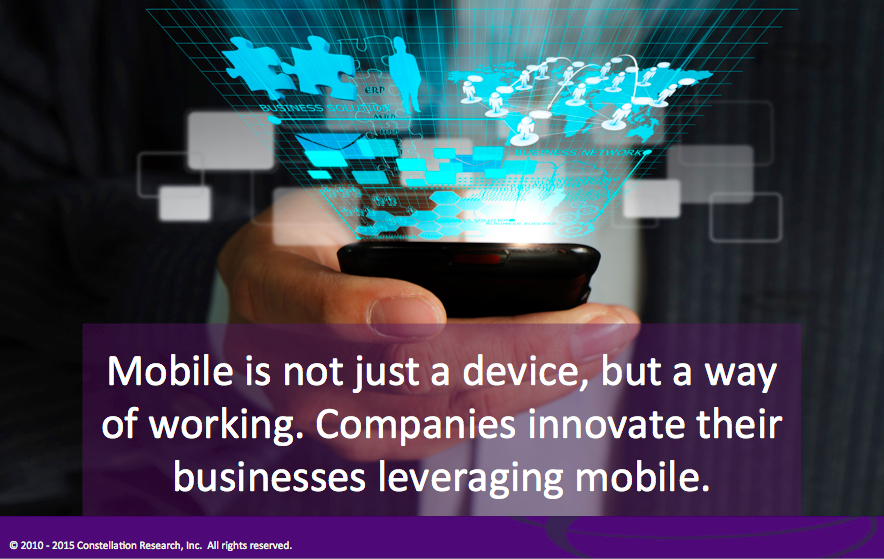In Q4 2014 Constellation Research surveyed over 500 organizations of at least 1,000 employees in the education, healthcare, high tech and retail industries to determine the current state of mobile transformation. This report uncovers three core areas:
- Mobile transformation is top of mind for most organizations: 82% of organizations reported having dedicated teams for mobile transformation. From an industry point of view, education had the lowest rate, with only 68 percent of organizations reporting they have dedicated mobile teams in place, while not surprisingly high-tech companies led the way with 91 percent.
- Mobile is not a device but an effective way of working: When people talk about mobile computing, thoughts usually turn to smartphones and tablets. While devices do play a role, mobile describes the larger topic of how people work in motion. Increasingly, more time is being spent away from the confines of a traditional office/desk environment, and working in short bursts while between other tasks is becoming more common. Sometimes, these “on-demand moments” could be as simple as glancing down at an email, but they could also be participating in a customer meeting or collaborating on a project while working at a coffee shop.
- Mobile provides a starting point for digital transformation: The top priority (50% of responses) for mobile usage with employees was improving communications, yet only 36% of responses indicated they are currently doing this well. The top priority (59% of responses) for mobile usage with customers was improving customer support, yet only 46% of responses indicated they are currently doing this well. Clearly a gap exists between the importance organizations see in mobile transformation and how effective they have been thus far in completing it.
Stage 2: Updating existing tools and processes to be accessible from mobile devices
Stage 3: Updating existing tools and processes to be leverage mobile specific features such as cameras, GPS, accelerometers, etc. and to work across a variety of device types
Stage 4: Implementing new tools and/or processes that change the core business (products, services, revenue models, etc.) of the organization
Mobile Transformation Top of Mind for a Majority of Organizations
- Most Organizations Have Dedicated Mobile Transformation Teams
- Mobile Transformation Projects Slightly Favor Internally Facing Projects
- Organizations Slowly Progressing to Higher Levels of Maturity in Mobile Transformation Projects
- Internal Projects Favor Communication and Collaboration Tools
- Mobile Support Trumps Mobile Sales and Marketing
- Recommended Actions: Take Full Advantage of Mobile
Mobile Is Not Just a Device, But an Effective Way of Working
- The Growth of Anytime Anywhere Computing Is Clear
- Constant Device Switching Is The Norm
- Most Organizations Start with Basic Mobile Work Patterns
- Recommended Actions: Apply Advanced Mobile Work Patterns by Industry for the Future of Work
Recognize the Challenges of Working Mobile
- Cultural Challenges Reflect the Always-On, Immediate Response Way of Work
- Technical Challenges Split across Four Key Concerns
- Recommended Actions: Build a Program That Reflects the Company Culture
The Future of Mobile Transformation Is Just around the Corner
- Biometrics and Wearable Computing Top Emerging Trends
- Internet of Things Can Enable a New Era of Communication and Collaboration
Apply the Constellation Framework for Mobile Transformation



